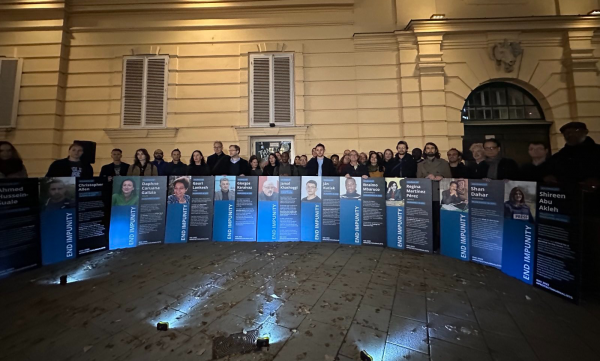The recent deaths of three journalists in Lebanon, Somalia, and Indonesia bring the number of journalists killed so far in 2012 to 35 – keeping this year on track to be the deadliest for the media since International Press Institute (IPI) record-keeping began in 1997.
At this same point last year, 23 journalists had been killed because of their work or while on assignment, according to IPI’s Death Watch. The final total, in 2011, of 102 journalist deaths is surpassed in IPI’s historical statistics only by 2009, with 110 deaths – of which 24 occurred on or before 10 April.
“We are witnessing, by a significant margin, the deadliest start to a year for the media in recent memory,” IPI Executive Director Alison Bethel McKenzie said. “As movements for democracy spread across the world, journalists – whose work is critical to any free society – are increasingly coming under violent attack.”
Bethel McKenzie underscored the particular danger facing journalists operating in or near Syria, where 11 domestic and foreign journalists have been killed since January. On Monday, a Lebanese cameraman working inside Lebanon near the Syrian border was killed by gunfire that reportedly originated from Syria.
Al-Jadeed television station on Monday accused Syrian troops of targeting its reporting team with a barrage of bullets that claimed the life of 30-year-old Ali Shaaban, the Beirut-based Daily Star reported. Radio Free Europe/Radio Liberty added that Shaaban died while being rushed to a nearby hospital.
Hussein Khreiss, an Al-Jadeed reporter accompanying Shaaban inside a station vehicle in the Wadi Khaled border area, was quoted as saying, “We were in Lebanese territory. We saluted the Syrian border guards who shouted at us to go back. We came under heavy fire for two hours from the Syrian side, from the regular Syrian army. Gunshots fell like rain.”
The alleged attack by Syrian forces prompted furious reactions from inside Lebanon. Prime Minister Najib Mikati said in a statement, “We deplore and condemn the shooting from the Syrian side on the Lebanese media crew, particularly that this crew was doing its duty inside the Lebanese border area.”
Both Mikati and the country’s president, Michel Sleiman, demanded that Syria investigate the incident and hold accountable those responsible for Shaaban’s death.
At least one leading Lebanese politician, former prime minister Fouad Siniora, accused the Syrian army of aiming to kill the Al-Jadeed crew, according to the Daily Star. The Syrian government has been suspected of masterminding previous attacks on journalists, including the February explosion in Homs that killed American foreign correspondent Marie Colvin and French photojournalist Remi Ochlik.
The Daily Star reported that Syria’s official news agency, SANA, rejected the suggestion that the journalists had been targeted. SANA said that a border post near to where the Al-Jadeed crew had been stationed had come “under heavy gunfire by armed terrorist groups … in an attempt to infiltrate into Syrian territory to carry out terrorist attacks. The border guards responded to the sources of gunfire.”
In Somalia on Thursday, an unknown gunman shot and killed radio reporter Mahad Salad Adan near the journalist’s home in the town of Beledweyne, approximately 330 km northeast of Mogadishu, according to local media. Adan is the fourth journalist killed in Somalia in 2012 and the fifth in the last five months.
Radio Garowe reported that Adan, a local correspondent for the Shabelle Media Network, was one of the few journalists working in Beledweyne, which had been a stronghold of the al-Qaeda-affiliated militant group al-Shabaab until Somali government forces captured the town last year.
The chairman of Shabelle Media Network, Abdimalik Yousuf Muhammud, condemned Adan’s killing and expressed frustration about impunity in cases of crimes against journalists. “No investigation into any of the murder of Somalia journalists in recent months has been made so far,” he said. Shabelle’s director, Hassan Osman Abdi, was shot dead in Mogadishu on Jan. 28.
The network also reported on Monday that at least one of its cameramen remained in serious condition after Wednesday’s apparent suicide bombing at the reopening of the Somali National Theatre. At least 10 journalists were seriously wounded in the attack, IPI reported last week.
Shabelle quoted local doctors as saying that the health situation of Sa’eed Shire Warsame, currently being treated in Madina hospital, “is very dangerous and he can’t be cured inside Somalia”.
IPI’s Bethel McKenzie said of the deaths of Shaaban and Adan: “Unfortunately, these two attacks offer a renewed reminder of the extreme perils of working as a journalist in Syria or Somalia – by far the two most dangerous places in the world for the media this year. Both countries are plagued by rampant impunity, allowing those threatened by the free flow of information to silence critical media without fear of consequences.”
Bethel McKenzie added: “The suggestion that the Syrian government may be directly targeting journalists – and those outside of its own borders no less – is deeply disturbing. We appeal to Syrian authorities once again to respect the rights of journalists, whose job is to report the facts.”
On Sunday, a local Indonesian journalist was killed when unknown gunmen fired on a small passenger plane landing at an airport in the country’s eastern Papua province.
According to Indonesia’s Alliance of Independent Journalists (AJI), Leiron Kogoya, a passenger in the Trigana Air Twin Otter, died shortly after being shot in the neck at Mulia Airport. AJI said that Kogoya had travelled to Mulia to report on elections in Jayapura, Papua’s capital, for Papua Pos Nabire and Pasifik Pos Dail.
Indonesian media reported that an additional four passengers and crew members, including the pilot, were wounded in the attack. The aircraft crashed into a building after the injured pilot lost control while taxiing.
AJI said that initial information suggested that Kogoya was not specifically targeted in the attack. According to news reports, such armed assaults are on the increase in Papua – the western half of the island of New Guinea – where separatists have waged a bloody struggle for independence from Indonesia since the 1960s.
Both Indonesia’s president and its national police chief condemned the attack and called for a full investigation, national news media reported.
“IPI extends its condolences to the families, friends, and colleagues of all three of these brave journalists,” Bethel McKenzie said. “There is still a chance to turn this terrible start to 2012 around – but only if national governments commit to bringing those responsible for crimes against journalists to justice.”


